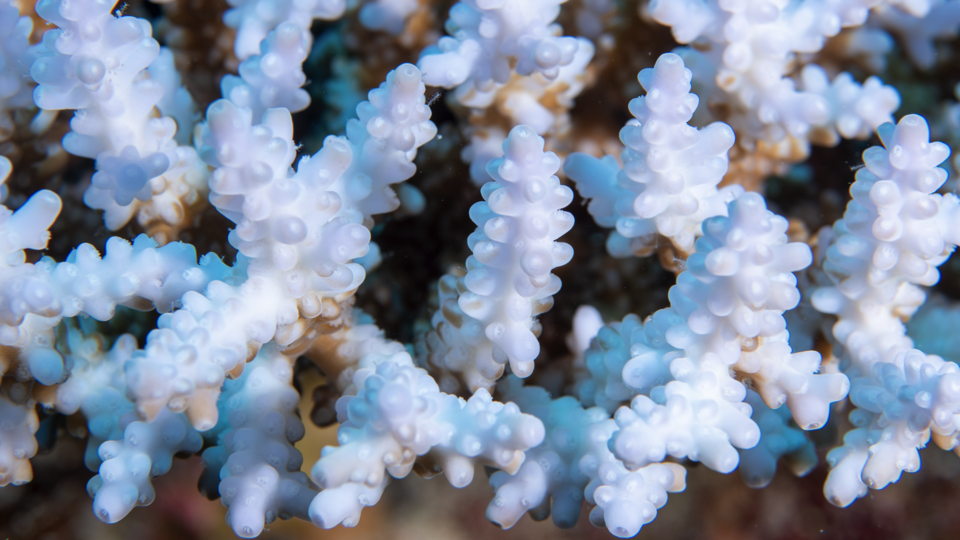The California Academy of Sciences is a renowned scientific and educational institution with a mission to regenerate the natural world through science, learning, and collaboration. Based in San Francisco’s Golden Gate Park, it is home to a world-class aquarium, planetarium, and natural history museum, as well as innovative programs in scientific research and environmental education—all under one living roof.

A bleaching Caroppora coral at about 130 feet deep in Australia’s Coral Sea. Photo credit: Luiz Rocha, California Academy of Sciences
Please see this recent press release from the Academy and the Australian Museum, detailing Dr. Rocha's recent surveys along the mesophotic Great Barrier Reef.
SAN FRANCISCO, CA (April 15, 2024) — The world is currently experiencing its fourth global coral bleaching event, and the second in the last 10 years, according to scientists from the National Oceanic and Atmospheric Administration (NOAA) and the International Coral Reef Initiative. A global bleaching event means that bleaching has been confirmed in all tropical ocean basins.
In response to the announcement, the California Academy of Sciences released the following statement from Luiz Rocha, PhD, curator of ichthyology and co-director of the Academy’s Hope for Reefs initiative. Rocha just completed the first-ever scientific deep dives in Australia’s Coral Sea at depths of up to 152 meters from March 25 to April 2 in partnership with the Australian Museum, the Minderoo Foundation, and Under The Pole.
“I am saddened but not surprised by the declaration of a fourth global coral bleaching event. It is very consistent with my diving experiences, including my most recent dives in Australia. During my trip last month to the Coral Sea and Great Barrier Reef, I saw corals bleaching all the way down to 60 meters (200 feet). This was one of the deepest records of bleaching and is very concerning because many people thought deep depths could be a refuge for corals.
“It was also very concerning that in the shallows we saw bleaching in corals of all sizes, from juvenile to adults, indicating that this event is killing corals of all ages.
"This fourth global coral bleaching is a loud and urgent call to action that we must take steps immediately to address climate change at all levels, from the personal level to within our local communities to national and international policies to reduce fossil fuel use and emissions. We look forward to working with scientists around the world, including the Great Barrier Reef Foundation in Australia, to provide critical monitoring of coral reefs and develop on-the-ground solutions to protect reefs that are most at risk.”
Additional resources:
- Video of a special conversation on collaborative efforts in monitoring and responding to coral bleaching in the Great Barrier Reef with Dr. Luiz Rocha, the Academy's Curator and Follett Chair of Ichthyology, and Dr. Cédric Robillot, Executive Director for the Reef Restoration and Adaptation Program. Moderated by Anna Marsden, Managing Director of the Great Barrier Reef Foundation.
- Underwater video by Academy Ichthyology Curator Luiz Rocha of bleaching Mussismilia hartii coral, a very unique species only found in Brazil.
The Institute for Biodiversity Science and Sustainability at the California Academy of Sciences is at the forefront of efforts to regenerate the natural world through science, learning, and collaboration. Based in San Francisco, the Institute is home to more than 100 world-class scientists, state-of-the-art facilities, and nearly 46 million scientific specimens from around the world. The Institute also leverages the expertise and efforts of more than 100 international Associates and 450 distinguished Fellows. Through expeditions around the globe, investigations in the lab, and analysis of vast biological datasets, the Institute’s scientists work to understand the evolution and interconnectedness of organisms and ecosystems, the threats they face around the world, and the most effective strategies for ensuring they thrive into the future. Through deeply collaborative partnerships and innovative public engagement initiatives, they also guide critical conservation decisions worldwide, inspire and mentor the next generation of scientists, and foster responsible stewardship of our planet.
Press Contacts
If you are a journalist and would like to receive Academy press releases please contact press@calacademy.org.
Digital Assets
Hi-res and low-res image downloads are available for editorial use. Contact us at press@calacademy.org to request access.